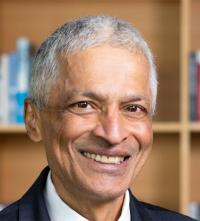
An Expert on Entrepreneurship Tackles Health Care Innovation
For 35 years, Amar Bhidé taught entrepreneurship—at Harvard, Chicago, Tufts, and Columbia, where he was Lawrence D. Glaubinger Professor of Business. He has written dozens of case studies, synopses of real-world scenarios crafted to spur vigorous classroom conversation, books on entrepreneurship, innovation, and the financial system, and op-eds on public policy issues for the Wall Street Journal, the Financial Times, and The New York Times.
In recent years, he’s increasingly delved into foundational questions about the complex, dynamic advances in productive knowledge. “It’s not just science” he quips. “The steam engine did far more for the laws of thermodynamics than laws of thermodynamics did for the steam engine.”
In January 2024, Bhidé accepted an appointment as a professor in Columbia Mailman’s Department of Health Policy and Management. He teaches the course “Lessons from Transformational Advances,” which digs into a series of case histories Bhidé developed to probe the complex, protracted processes that produced life-altering drugs, devices, and practices.
One case describes how despite a long history and contemporary clinical promise—the widespread use of fecal microbiota transplant to treat gastrointestinal disease has been stymied by regulatory hurdles and provider resistance. The case on tamoxifen shows how tamoxifen became a gold-standard treatment for breast cancer—after failing as a contraceptive.
The overarching goal is to inspire, not just inform students about how new treatments and practices evolve. “The cases show how contributing to progress offers great scope for personal flourishing, whatever your role and whatever your financial reward may turn out to be,” says Bhidé.
Is there a core theme in your work?
Bhidé: I’ve gone from looking at things principally from a businessperson’s, an entrepreneur’s point of view, to trying to understand the overall process of how productive knowledge advances. But the core theme has been the human striving for change and betterment that cannot be reduced to an algorithmic formula.
How did you make the pivot to advances in medicine?
Bhidé: As it happens my mother was a pioneering cancer researcher, and my sister is an oncologist. But, with my general interest in productive knowledge, I could have written about anything—advances in computer science. I didn’t. I wrote about medical innovations. This was lucky. Health care is a broad arena but nonetheless has some common features.
What do you hope your students take from the case studies?
Bhidé: The process of practical advances is complicated, protracted, and involves a large cast of characters. There is instrumental and humanistic value in appreciating these processes: We could do things better in the future if we understand how past advances come about. They also teach us what makes us human.
In December, Oxford University Press will publish your fifth sole-authored book, Uncertainty and Enterprise: Venturing Beyond the Known. How did it come about?
Bhidé: The book represents the culmination and synthesis of much of my writing and research. There are also many points of overlap with the seminar on transformational advances I’m currently teaching. The case studies have informed the book and the ideas that I’ve tried to distill in the book have informed how I’m teaching the course.
What are the foundational principles of Uncertainty and Enterprise?
Bhidé: We cannot or should not be sure of anything. We cannot be sure of what is or what was, and even less what could be or what should be. We can have only conjectures, provisional hypotheses that combine imagination and evidence. And inevitably, our conjectures diverge while much of our actions are interactive. We can’t act unilaterally. Imaginative yet grounded discourse plays a crucial role in aligning our conjectures.
Who is your target audience?
Bhidé: I want to persuade mainstream economists that there’s a broader way of looking at the world that—if they adopted it—could be beneficial to themselves and to society. A second target is the intellectually curious, possibly “highbrow,” general reader about the rewards, challenges, and reasonable ways of dealing with uncertainty that is so central to our lives, yet are often ignored in economics and decision theory. I don’t however want to pick a fight with mainstream economics or provide cookbook recipes to general readers.
This fall, Project Syndicate published your op-ed calling large learning models “mendacious talking horses.” Another for Barron’s calls out the current AI investment craze a mania. What sparked your ire?
Bhidé: Writing my Uncertainty book has a lot to do with it. I tried to use LLMs to research, edit, and illustrate the book—it was a source of unending frustration, though “earlier” AI was invaluable. I also studied the evolution of AI for my book. AI grew out of a “fork” in the cognitive revolution of the 1950s and 1960s which conceived of the mind as a computer, often relying on statistical models to recognize patterns. A second fork treated the mind as a “meaning constructor” where meaning was highly contextual, historical, and cultural. Both forks have value.
Long before LLMs, statistical AI had proven its worth in many applications. But reducing all thought and speech to a mindless statistical model is absurd. Yet that’s what many LLMs try do. The LLM mania also ignores the protracted trial and error through which cost-effective AI applications have emerged over the last 70 years. The mania also shows how ignorance of how transformational technologies like AI evolve can become a social menace.
